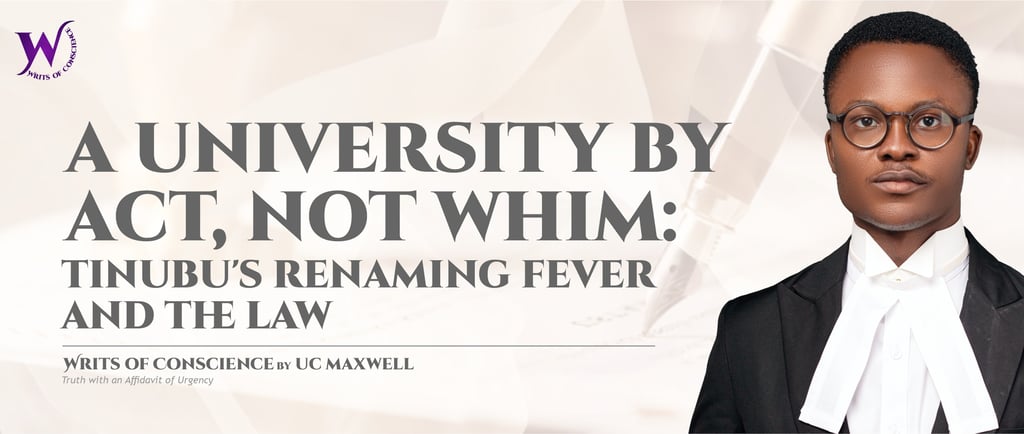A University by Act, Not Whim: Tinubu’s Renaming Fever and the Law
Renaming the University of Maiduguri by executive fiat is deeply problematic. It bypasses legislative authority, disregards institutional stakeholders, and risks eroding public trust in governance norms.
UC Maxwell
7/24/20253 min read


President Bola Ahmed Tinubu recently declared at a special Federal Executive Council session convened in tribute to the late President Muhammadu Buhari that the University of Maiduguri would henceforth bear the name "Muhammadu Buhari University, Maiduguri". The statement, which was obviously an afterthought just before the closing prayer was said, centered on a tribute to Buhari’s perceived discipline, integrity, and service to the nation.
This decision comes barely two years into the Tinubu administration, which has shown unusual zeal for renaming public institutions and infrastructure in honour of the President. Recall that the commissioning of the National Assembly Library Trust Fund was delayed for months, only for the name to be changed from “Femi Gbajabiamila Building” to “Bola Ahmed Tinubu Building”. This is one of many of such, including the 34-year-old International Conference Center which was renamed “Bola Ahmed Tinubu International Conference Center” just after renovation works which gulped an outrageous N39Billion.
From a legal standpoint rooted in constitutionalism and statutory process, the proposed renaming of the University raises fundamental constitutional questions. The University of Maiduguri was established by the University of Maiduguri Act, which explicitly states in Section 1 that it is "a university... to be known as the University of Maiduguri... shall be a body corporate". A presidential pronouncement, even before the Federal Executive Council, does not amend legislation.
Under Nigerian constitutional norms, renaming a federal institution established by an Act of the National Assembly requires a legislative process enshrined in Section 58 of the Constitution of the Federal Republic of Nigeria 1999. Significantly, Chapter XI of the Senate Standing Orders and Order XII of the House Standing Orders deal with procedure on Bills. Without this process, any attempt by university authorities, the Senate or the Governing Council, to implement the new name on documents, signage, campus facilities, or academic credentials would be ultra vires, beyond their legal powers, and potentially voidable in court.
This process of law-making is therefore a serious business that courts are enjoined to take judicial notice of the course of proceedings in the National Assembly. See Section 122(2)(a)(b)(c) of the Evidence Act 2011. Therefore, any unilateral renaming undermines institutional integrity and governance norms.
Ironically, the Buhari name is not strange to infrastructures in Borno, the University already features multiple edifices bearing Buhari’s name and that of his wife, like the Muhammadu Buhari Senate Building, and the Aisha Buhari Girls Hostel. Conversely, the international airport in Borno was renamed the General Muhammadu Buhari International Airport. These proliferating dedications prioritize political symbolism over substance.
While I kick against the renaming of federal or state institutions of learning with names of individuals, especially politicians, this renaming coincides with the university’s 50th anniversary set to take place in a few months, a symbolic milestone. If there must be naming rites, General Murtala Muhammed, the historical founder who established several federal universities in 1975 (including Maiduguri), remains unacknowledged in naming rites, a notable oversight given his central academic legacy during his eventful 198 days as Nigeria’s fourth head of state.
Renaming the University of Maiduguri by executive fiat is deeply problematic. It bypasses legislative authority, disregards institutional stakeholders, and risks eroding public trust in governance norms. If unchallenged, it sets a dubious precedent as any institution created by statute could be casually renamed in memory of individuals, regardless of their connection to its mandate or mission.
More troubling is the broader political context. The Tinubu administration faces mounting challenges of surging inflation, economic hardship, insecurity, and faltering development. Rather than addressing these crises, the government appears preoccupied with symbolic gestures that evade accountability and fail to deliver tangible benefits to millions suffering under an overtaxed economy.
The right course is clear, any change to the university’s name must proceed through due legislative channels. Until then, the University of Maiduguri remains a corporate body created and named by statute, impervious to rhetorical declarations made in FEC chambers. The law demands respect, the Constitution demands process, and the nation deserves institutions anchored not in political symbolism but in legal integrity and accountability.
UC Maxwell is a Legal Practitioner who brings clarity and conviction to national conversations. His writings focus on constitutionalism, governance, and the rule of law.




